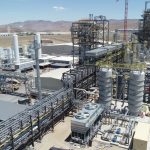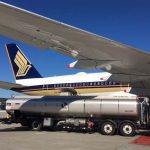British Airways has moved to extend its sustainable aviation fuel (SAF) ambitions with an investment in alcohol-to-jet (ATJ) producer LanzaJet, which is building its first commercial-scale plant in Georgia, USA. The airline will purchase SAF produced at the Freedom Pines Fuels facility from sustainably-sourced ethanol, with first deliveries expected late 2022, possibly to power BA flights from US airports to the UK. The partnership, which includes collaboration between BA and parent IAG’s Hangar 51 accelerator programme, also involves LanzaJet conducting early-stage planning for a potential large-scale commercial SAF biorefinery in the UK. British Airways has an existing partnership with sustainable fuels technology company Velocys that aims to build a facility in north-east England to convert household and commercial waste into renewable jet fuel. LanzaJet shareholder LanzaTech has a long-standing partnership with Virgin Atlantic, with plans to build an ATJ facility in Wales that has already received a grant from the UK government towards project development funding. LanzaTech recently announced it was forming a consortium called FLITE with SkyNRG to build Europe’s first of its kind ATJ plant.
“Progressing the development and commercial deployment of SAF is crucial to decarbonising the aviation industry and this partnership with LanzaJet shows the progress British Airways is making as we continue on our journey to net zero,” commented British Airways CEO Sean Doyle.
LanzaJet was formed in June last year with investment from LanzaTech, Canadian integrated energy company Suncor Energy and Japanese global trading and investment company Mitsui & Co. All Nippon Airways (ANA) is also supporting the venture through an offtake agreement and has already used a portion of fuel produced at Freedom Pines’ initial demonstration facility on a transpacific delivery flight of a new Boeing aircraft from Everett to Tokyo in 2019. Fuel from the 4,000-gallon batch was also used on a commercial passenger flight operated by Virgin Atlantic from Orlando to London Gatwick in 2018.
Details of BA’s investment have not been released although Suncor and Mitsui have invested $15 million and $10 million respectively to establish LanzaJet, with a further $14 million grant from the US Department of Energy. The funding is being used to build the Freedom Pines integrated biorefinery that will produce 10 million gallons per year of SAF and renewable diesel from sustainable ethanol sources. In addition to its equity investment, Suncor has contracted to take a significant portion of the SAF and renewable diesel for its customers. Once technical and economic targets have been met, further investment and a capital call are planned, says LanzaJet.
With the addition of British Airways, the company now plans to develop a further four larger scale plants producing SAF and renewable diesel to operate from 2025, possibly some or all being built in the UK subject to “improved” government policy support for waste-based SAF, it says. The early-stage work for a potential commercial facility in the UK for BA will be conducted in parallel to the construction of the Georgia plant to shorten development timescales, said a spokesperson for LanzaTech.
“Following the successful start-up of the Georgia plant, we hope to then deploy the technology and SAF production capacity in the UK,” said Doyle. “The UK has the experience and resources needed to become a global leader in the deployment of such SAF production facilities.”
British Airways and LanzaTech are also members of the Jet Zero Council, a government/industry partnership to drive the net-zero ambitions of the UK government and aviation sector, which has a focus on SAF. “We need government support to drive decarbonisation and accelerate the realisation of this vision,” added Doyle.
BA has recently teamed up with Zeroavia in a hydrogen-powered aircraft project and parent company IAG plans to invest $400 million in SAF over the next 20 years.
LanzaJet CEO Jimmy Samartzis said: “British Airways has long been a champion of waste to fuel pathways, especially with the UK government. With the right support for waste-based fuels, the UK would be an ideal location for commercial-scale LanzaJet plants.”
The LanzaTech partnership with Virgin Atlantic goes back nearly a decade. “We continue to work with Virgin Atlantic and the LanzaJet investment from BA does not affect this,” said the LanzaJet spokesperson. “We are looking forward to our continued partnership with Virgin in developing the scale-up of ATJ in the UK.”
The Freedom Pines plant will convert any source of sustainable ethanol – which can be made, for example, from non-edible agricultural residues such as wheat straw, municipal solid waste and also LanzaTech’s own developed technology that recycles waste industrial gases – into renewable jet fuel and diesel through a process patented by LanzaTech. The company claims its jet fuel delivers a reduction of more than 70% in GHG emissions compared to conventional fossil jet fuel. LanzaJet has exclusive rights to the ethanol-to-fuel process and permission to commercialise the technology, said Samartzis, who joined the company last year, having previously served at IATA, Airlines for America and United Airlines.
The new pre-commercial plant will be adjacent to the old demonstration cellulosic ethanol production facility in Soperton, 250 kms south-east of Atlanta, that LanzaTech acquired in 2012 following the collapse of Range Fuels.
“We’ve made very good progress on the engineering and fabrication front and we’re taking a very innovative approach to applying the technology, so enabling us to accelerate the pace,” reported Samartzis on the ambitious plan to start producing fuels as early as late next year.
Photo: British Airways















More News & Features
Lessons learned from the collapse of Fulcrum BioEnergy
Early data shows uncertainty that UK SAF mandate can be met in its first year
Swiss advanced SAF technology startups Metafuels and Synhelion reach project milestones
PtX fuels have significant Asia-Pacific potential but face many barriers, finds report
Airfreight giants DHL Express and FedEx announce big US SAF deals
Asia-Pacific study reveals pessimistic outlook for SAF uptake by 2030 as Singapore details levy